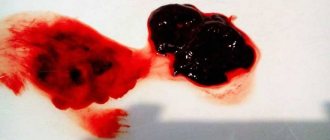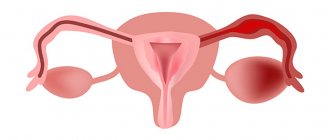Unpleasant sensations in the vagina alarm every woman, and the feeling of anxiety and restlessness is especially acute during pregnancy. Pulsation and pain inside the vagina may indicate the development of some pathology in the body. Such unpleasant symptoms in most cases are characteristic of diseases of the genitourinary system. Pregnant women also often experience a sensation of pulsation. If pain and throbbing appear, you should not panic or look for ways to solve this problem yourself.
Why it pulsates in the vagina, only a highly qualified gynecologist can answer you after a carefully conducted comprehensive examination of the body.
Causes
First of all, unpleasant vaginal twitching may be associated with a disease that is not related to diseases of the reproductive system. Cystitis can cause throbbing in the vagina.
If the unpleasant sensations are accompanied by the urge to urinate, then inflammation of the bladder is evident. Additionally, pain may occur when emptying the bladder of urine. Pulsates in the vagina for many reasons. With such a complex of symptoms, you need to consult a doctor and take a general blood and urine test.
Inflammation of the vagina may be accompanied by pulsation of this part of the reproductive system. Among other symptoms, it is necessary to note the appearance of copious discharge from the genital tract.
Each sexual intercourse with inflammation of the vagina is accompanied by pain. It will also hurt when urinating. Inflammation of the vagina is very often accompanied by inflammation of the labia, so itching and redness of the external genitalia may be added to the main symptoms of colpitis.
The doctor will be able to tell you exactly the essence of the problem after a smear is taken for the flora. A symptom such as pulsation is not sufficient to make a diagnosis. This is more of an indirect sign of disease.
Pregnancy
Pregnancy is another condition that can be accompanied by vaginal throbbing. Moreover, such sensations are rather more characteristic of its initial stage. It is believed that in this way the body informs the woman about pregnancy.
After the embryo is fixed in the uterine cavity, all parts of the reproductive system begin to be actively supplied with blood. As a result, blood begins to actively flow through the vessels to the vagina and because of this, the organ begins to pulsate. At the same time, according to many women, the feeling is as if the vagina is rhythmically contracting.
During traumatic sexual intercourse, the vagina also pulsates. In a normal state, a special secretion is secreted in the vagina, which should reduce friction during sexual intercourse and ensure the advancement of sperm. If for some reason there is no secretion, after the end of sexual intercourse the vagina begins to pulsate.
A young mother may confuse some of the baby's first movements with pulsations in the vagina. In later stages of pregnancy, the baby may swallow amniotic fluid, which may cause hiccups, which will be accompanied by involuntary movements. These movements can also be perceived by the woman as pulsation in the vagina.
The simplest explanation for vaginal pulsation may be to observe the inferior vena cava. During pregnancy, it is compressed due to the fact that the uterus greatly increases in size closer to childbirth. Poor blood circulation in the vessels causes pulsation. In this case, doctors do not advise pregnant women to sleep on their back, since in this position the blood vessels will be compressed even more.
The vagina may also pulsate after childbirth, when it is severely stretched. If, apart from pulsation, there are no other disturbing symptoms, then you should be afraid and pay attention to the unpleasant sensations. Soon they will completely disappear as the body recovers.
Women's secrets: vulvodynia - pain in the vestibule of the vagina
Vulvodynia is chronic pain or discomfort in the vulva, the opening to the vagina, that has occurred for at least 3 months and for which there is no reasonable explanation.
The pain, burning or irritation caused by this disease can bring so much discomfort into a woman’s life that it makes it simply impossible to sit for a long time or have sex.
This condition can last from several months to several years. If you encounter this problem, be sure to seek help from a doctor, even if there are no other symptoms other than pain.
To date, various treatment options for vulvodynia have been developed. An experienced gynecologist will determine the cause of your discomfort and select adequate therapy.
Symptoms
The main symptom of vulvodynia is discomfort in the genital area, which can manifest as:
- burning sensation and itching,
- tingling sensation
- soreness or acute pain at rest,
- pain during sexual intercourse,
- twitching and pulsating sensation.
These symptoms may be permanent or transient. For example, they may only appear when you touch a sensitive area.
The pain can be felt throughout the inner surface of the vulva (generalized), or it can be localized in a specific place, for example, near the entrance to the vagina (vestibule).
A similar condition, vestibulodynia or vulvar vestibulitis, is accompanied by pain only when pressure is applied to the area. At the same time, visually, the vulvar mucosa may look either slightly inflamed or swollen, or simply not irritated.
When to see a doctor?
Vulvodynia is quite common, although women are reluctant to tell doctors about it.
However, if you experience pain in the genital area, go to the gynecologist. It is important that your doctor rule out other known and treatable causes (such as yeast or bacterial infections, herpes, precancerous conditions, genitourinary menopause syndrome, and other underlying conditions such as diabetes).
Don't try to get rid of the pain on your own by thinking it's "thrush" and taking over-the-counter medications to treat yeast infections. Only a doctor will be able to assess the symptoms and choose treatment tactics, depending on what is identified.
Causes of vulvodynia.
To date, the causes of vulvodynia remain unknown. However, the most likely contributing factors include:
- damage or irritation to the nerves surrounding the vulva area,
- past vaginal infections,
- tendency to allergies or increased sensitivity of the skin and mucous membranes,
- hormonal changes,
- muscle hypertonicity or, conversely, weakness of the pelvic floor muscles that support the uterus, bladder and intestines.
Complications.
Because sexual intercourse is intensely painful, vulvodynia can cause associated emotional problems. For example, fear of sexual intercourse can cause spasm of the vaginal muscles (vaginismus).
Other known complications may include:
- anxiety,
- depression,
- sleep disturbance,
- sexual dysfunction,
- individual psychological problems and difficulties in relationships with a partner,
- decreased quality of life.
Diagnostics.
Before diagnosing vulvodynia, the doctor will ask you about your health, sex life, past surgical interventions, listen to your complaints, and assess the relevance, nature and degree of symptoms.
The doctor will also:
Gynecological examination . Visual examination of the external genitalia and vagina for signs of infection or non-infectious lesions. Even if there are no visual signs of infection, the doctor may take smears, for example, to detect thrush or bacterial vaginosis.
Cotton swab test . Your doctor will use a soaked cotton swab to check for localized areas of tenderness in the vulvar cavity.
Treatment.
Treatment for vulvodynia is aimed at relieving symptoms and does not have a universal regimen. For many patients, a combination of different procedures is most effective. Sometimes it takes a significant amount of time to select the right treatment method, as well as a long period after the start of therapy, before obvious relief occurs.
Known treatment options:
Drug therapy . Steroids, tricyclic antidepressants, or anticonvulsants may help relieve chronic pain. Antihistamines will relieve itching.
Therapeutic auto-training. This therapy will help reduce pain by teaching you to relax your pelvic muscles and control your body's response to illness.
Local anesthesia. Topical medications such as lidocaine ointment provide temporary relief of symptoms.
Your doctor may recommend using lidocaine 30 minutes before sex to reduce discomfort.
Please remember that using lidocaine ointment may cause your partner to experience decreased sensation and temporary numbness in the skin of the penis after sexual intercourse.
Nerve blockades. Women who have long suffered from pain that has not responded to other treatments may benefit from injectable nerve blocks in the vulva area.
Pelvic floor therapy. Many women with vulvodynia experience hypertonicity of the pelvic floor muscles, which support the uterus, bladder and bowels. Exercises to relax these muscles can help relieve the pain of vulvodynia.
Surgical intervention. In cases of localized vulvodynia or vestibulodynia, surgery to remove skin and tissue (vestibulectomy) from the affected area relieves pain in some women.
Lifestyle and home remedies.
The following tips may help you manage the symptoms of vulvodynia:
*Use of cold compresses. Place them directly on the outer genital area to relieve pain and itching.
* Taking a sitz bath. Two to three times a day, sit in comfortable, warm (not hot) or cool water with Epsom salts (magnesium sulfate, at the rate of 0.5 - 1 kg per bath) or oatmeal infusion for 5 -10 minutes.
* Avoid tight tights and synthetic underwear. Tight clothing restricts air flow to the genital area, which often leads to increased temperature and humidity and can cause irritation. Wear white cotton underwear to increase ventilation and dryness. Try sleeping without underwear at night.
* Avoid hot baths. Prolonged exposure to hot water can cause discomfort and itching.
*Do not use deodorized tampons or pads. Deodorant can be irritating. If pads cause irritation, replace them with natural cotton gauze pads.
* Avoid activities that put mechanical pressure on your vulva, such as cycling or horseback riding.
* Wash yourself carefully. Over-cleaning the affected area or washing it too often can increase irritation. Use plain water, wash your vulva with your hand, and pat dry. After bathing, apply a preservative-free emollient such as Vaseline to create a protective barrier.
* Use lubricants (lubricant). If you are sexually active, apply lubricant before sex. Do not use lubricants containing alcohol, fragrances, or heating or cooling agents. Choose condoms whose lubricant does not irritate your mucous membranes and use only them.
Alternative medicine.
Stress tends to stimulate vulvodynia, and having vulvodynia increases stress. Although there is no clear evidence that alternative methods work, some women find some relief from yoga, meditation, massage and other stress-reducing tools.
Support for friends in misfortune
You may find talking to other women who suffer from vulvodynia helpful because it provides a new source of useful information and makes you feel less alone. If you don't want to join a group, find an individual consultant who has experience helping women with vulvodynia.
You and your partner may need the help of a sex therapist to cope with the impact of vulvodynia on your relationship.
Preparing for a visit to the doctor.
Most likely, you will start by contacting your primary care gynecologist.
Before your visit:
- write down your symptoms (including those that may seem unrelated to vulvodynia), their intensity and when they started;
- Take a medical history, including other illnesses for which you may be being treated;
- write down all medications, vitamins, or other supplements you take, including dosage.
Make a list of questions for your doctor:
- What could be causing my symptoms?
- What tests do you recommend?
- What treatments are most likely to improve my condition?
- Is this condition permanent or temporary?
- When can you expect relief from discomfort?
- I have other diseases, what should I do?
- Are there any printed materials on this disease? What sites do you recommend?
Feel free to ask other questions.
Your doctor will likely ask you the following questions:
- How severe is your pain and how long does it last?
- How would you describe your pain: sharp or dull, continuous or paroxysmal?
- Is your pain more likely to be triggered by a specific event, such as sexual intercourse or exercise?
- Do you feel pain during urination or bowel movements?
- Does your menstrual cycle affect your pain?
- What can increase or decrease the sensation of pain?
- Have you had surgery on the pelvic organs?
- Have you been pregnant or maybe you are pregnant now?
- Have you been treated for a urinary tract or vaginal infection?
To solve problems associated with vulvodynia, you can make an appointment with a gynecologist at our clinic by calling:
(812) 312-65-65 or 716-26-86
Source: https://www.delikatno.ru/articles/vulvodiniya
Pathologies
It makes sense to see a doctor if the pulsation in the vagina is accompanied by other more specific symptoms, such as burning, discharge, especially if it has an extremely unpleasant odor. An alarming symptom may be vaginal pulsation that occurs against the background of bleeding.
Severe pain in the groin and lower back, appearing along with pulsation, is a serious reason to start an examination. The same can be said about rising temperatures. In this case, pulsation will be one of the manifestations of more serious diseases.
For example, nausea and weakness against the background of pulsation in the vagina are quite serious signs of circulatory failure in the lower part of the body. Throbbing pain during sexual intercourse may be a sign of inflammatory lesions of the cervix or the presence of erosions on the cervix.
Very often, pulsation in the vagina can be one of the signs of a monthly cycle failure. This symptom is present during hormonal imbalance in women suffering from abnormal bleeding. In this case, pulsation may accompany spotting, the appearance of which is not related to menstruation.
Pulsation in the vagina can be an individual reaction to certain processes occurring in the body. Such pathologies include endometriosis, tumors of the uterus, ovaries and fallopian tubes. Hormonal imbalance can sometimes cause vaginal pulsation.
If the pulsation recurs periodically and creates serious discomfort, you should consult a doctor and look for the cause of the incomprehensible symptom. The doctor will not be able to immediately name the reason for the appearance of pulsation in the vagina. The examination and tests will take some time.
Consultation required
You should immediately make an appointment with your doctor if the pulsation is accompanied by the following symptoms:
- Burning sensation.
- Discharge with an unpleasant odor.
- Bleeding from the vagina (especially during pregnancy).
- Severe pain in the groin, kidneys, lower back and, in fact, in the vagina.
- Increased body temperature.
- Weakness and loss of appetite.
Since the sensation of pulsation can sometimes indicate the development of a disease in the body, it is very important to identify it in time and begin treatment.
The occurrence of a tic in the vagina definitely causes some discomfort to a woman. Sometimes strange sensations can frighten her and make her worry about her own health.
In some cases it goes away on its own, and sometimes it lasts for a certain period. No matter what, if this is of great concern, you need to make an appointment with a gynecologist who will conduct an examination and determine the cause.
Diagnostics
A routine examination, which is carried out by a gynecologist when a woman seeks help, will not provide the information necessary to make a diagnosis. All that a doctor can detect is swelling of the mucous membrane and redness of the labia. These changes cannot explain the appearance of pulsation.
A little more information can be extracted from the results of a smear on the flora. The presence of certain pathogenic microorganisms indicates the presence of an inflammatory process, which in some situations may be perceived by a woman as vaginal pulsation.
Problems with secretion production can be detected by donating blood for hormones. The production of secretions depends on the functioning of the endocrine glands. Ripple may occur due to some changes received by a woman by inheritance.
Doctors are most often inclined to believe that the cause of pulsation in the vagina is a violation of innervation. Because of this, a woman can experience a variety of unpleasant sensations. This diagnosis is indicated if no other abnormalities causing pulsation in the vagina have been detected.
Some of the sensations that women experience are difficult to describe in words. These include pulsation in the vagina. Doctors explain that this happens when muscles contract. This phenomenon is normal in most cases. If the patient tries to describe the contractions of the uterus, she usually explains her sensations as rhythmic twitching. Could such symptoms be associated with some pathology?
Pulsation of the labia
Throughout her life, a woman has to experience a variety of sensations associated with the functioning of the genital organs. Some of these sensations are short-term, while others associated with pathologies can cause anxiety for a long time.
Some sensations are very difficult to describe in words, such as pulsation in the vagina. In some cases, such incomprehensible symptoms are frightening. Why does the vagina pulsate?
According to doctors, the vagina begins to pulsate due to muscle contraction, and this behavior is normal, and therefore has nothing to do with pathology. If a woman tries to describe uterine contractions, she explains her sensations as rhythmic twitching. Could such symptoms be associated with some pathology?
Pulsation in early pregnancy
Pulsation in the vagina during pregnancy is usually a physiological norm. Such sensations are typical in the early stages. A slight pulsation gives a woman a reason to guess about her position even before her menstruation is delayed. The fact is that after implantation of the embryo into the uterine cavity, which occurs three to seven days after fertilization, all parts of the reproductive system begin to be actively supplied with blood. The result is a pulsating sensation.
Feelings of hiccups in a baby
A pulsating sensation in the vagina may occur around the seventh month of pregnancy. This happens because the baby develops hiccups. There is no need to worry about this. The child simply swallows amniotic fluid while trying to independently control the breathing process. Pulsation in the vagina can be felt for several minutes to several hours. The expectant mother should not worry if the ultrasound did not show the presence of pathologies of the respiratory and digestive systems in the fetus.
Pulsation in the last trimester
In the last three months of pregnancy, pulsation may appear from time to time due to compression of the inferior vena cava, which provides normal blood supply to the organs of the female reproductive system. Compression occurs due to a significant increase in the size of the uterus and fetal pressure. Usually felt when lying on your back. In this case, it is enough to change the position of the body. With a critical lack of blood supply, the woman feels dizziness, weakness and nausea. If you have such symptoms, you should immediately consult a doctor.
In most cases, pulsation in the vagina during pregnancy is a physiological norm. But it’s still worth telling your gynecologist about unusual sensations at your next scheduled examination. If the pulsation is accompanied by atypical discharge from the genital tract, weakness and poor health, pain, then you should seek medical help as soon as possible.
Pulsation in the vagina during pregnancy
While carrying a child, a woman notices any, even the smallest, changes in the condition of her body. In addition to the many pronounced symptoms characteristic of pregnancy, women sometimes notice a feeling of pulsation in the vagina. Depending on the stage of pregnancy, this can be explained by various reasons:
- Throbbing and a feeling of slight pain in the lower abdomen may be a sign of pregnancy. Sometimes a woman is not even aware of her situation, but if the pregnancy is long-awaited and planned, then these sensations tell the woman about the onset of a joyful event;
- It pulsates in the vagina during pregnancy and also during the appearance of hiccups in the baby. This condition usually appears at 7 months of pregnancy. You should not panic because of the occurrence of hiccups; this is explained by the ingestion of amniotic fluid while the child is trying to control the breathing process. Pulsation in the vagina can last from several minutes to several hours. If an ultrasound examination does not show any pathologies of the respiratory and digestive systems in the fetus, then the expectant mother should not worry;
- In the last trimester, the vagina may pulsate due to partial compression of the inferior vena cava, which provides blood supply to the organs of the reproductive system. Compression occurs due to a significant increase in the size of the uterus and fetus. As a rule, the sensation of pulsation stops after changing body position. However, if a woman feels dizzy, nauseated and weak, this indicates a critical lack of blood supply. In such a situation, you need to urgently consult a doctor;
- Many pregnant women feel the baby's movements in the form of pulsation in the lower abdomen and vagina. If this process does not cause a deterioration in the woman’s condition, then there is no reason for alarm;
During pregnancy, pulsation in the vagina is in most cases considered a physiological phenomenon. But still, you should tell your gynecologist about the appearance of such a sensation during a scheduled examination. If the pulsation is accompanied by the appearance of vaginal discharge, pain or deterioration in general health, then medical help should be sought immediately.
Injuries to the walls of the vagina and cervix
Often the vagina is injured during rough sexual intercourse. The risk of injury increases due to insufficient natural lubrication. In this case, it is additionally necessary to use lubricants, but if you use condoms as a means of contraception, then you need to choose water-based products.
The problem of vaginal dryness appears due to the lack of foreplay or hormonal imbalance in a woman’s body. The secretion of lubrication is impaired due to insufficiency of the hormone estrogen. After sexual intercourse, a woman feels a burning sensation and pain in the vagina, and bleeding of varying intensity may occur. Thus, due to injury to the cervix, throbbing pain appears during intercourse.
Vaginal pulsation during orgasm is normal and should not cause concern. Close-up scenes like this are shown in many 18+ films. This occurs due to muscle contraction, in addition, breathing and heart rate increase. And if the pleasure is very strong, then the lower abdomen may also pulsate.
Causes of pulsation in the vagina
Most diseases of the urogenital area in women are, to one degree or another, accompanied by unpleasant sensations in the vagina. Women who are sexually active especially often complain of throbbing pain in the vagina. The most common pathological conditions in which such a symptom occurs include:
- Traumatization of the walls of the vagina and cervix: most often the vagina is injured during rough sexual intercourse. Insufficient natural vaginal lubrication increases the risk of this condition. This problem manifests itself due to the lack of foreplay or due to hormonal imbalance in a woman’s body. The secretion of vaginal lubrication is impaired due to insufficiency of estrogen in a woman’s body. After sex, a woman feels throbbing pain in the vagina, a burning sensation, and possible bleeding. Throbbing pain can also appear due to traumatization of cervical erosion during sexual intercourse;
- Inflammatory diseases: sexually transmitted infections in women most often provoke the occurrence of an inflammatory process in the vagina. Depending on the causative agent of the infectious disease, the clinical picture may be different. However, if the vaginal mucosa is affected and purulent discharge appears, these symptoms are usually accompanied by throbbing pain. Also, in the acute period of development of the disease, a woman may notice a significant deterioration in general health, increased body temperature, nausea, weakness, problems with appetite and sleep;
- Menstrual irregularities: Painful throbbing in the vagina may be a sign of an irregular menstrual cycle. Women with abnormal vaginal bleeding often suffer from such pain. This pathology is characterized by the appearance of bloody discharge at the wrong time when menstruation should begin. This condition can be triggered by a number of diseases of the genitourinary and other body systems: neoplasms of the internal genital organs, endometriosis, infectious diseases, pathologies of the blood system, hormonal imbalance. If bloody discharge occurs, accompanied by throbbing pain, you should immediately seek medical help;
- Pain in the vagina after childbirth: an unpleasant pulsating sensation in the vagina in the postpartum period is often associated with trauma to it during the birth of a child. Tears, cracks, and the use of special obstetric instruments during childbirth are the main cause of pain and discomfort;
- Vulvodynia: this pathological condition is characterized by the presence of chronic pain in the area of the external genitalia and the vestibule of the vagina in women. The development of the disease is not associated with injury or infection. The cause of painful pulsation in the vagina is a violation of the innervation of the genital organs , due to which the woman experiences constant discomfort. Hereditary predisposition also plays a certain role in the development of pathology. Vulvodynia has a very detrimental effect not only on a woman’s physical condition, but also on her mood and self-esteem. In addition to throbbing pain, burning and itching may occur;
Inflammatory processes
Pulsation in the vagina often accompanies inflammatory processes in the genitourinary system. Depending on the pathogen, the clinical picture can vary significantly. Typically, throbbing pain accompanies the appearance of purulent discharge from the genital tract. In the acute period of the disease, a woman may notice a deterioration in her health, nausea and weakness, apathy, fever, and problems with sleep and appetite are often noted.
With cystitis (inflammation of the walls of the bladder), along with pulsation, there is a desire to frequently run to the toilet, as well as pain and burning when urinating with short-term relief. In the vast majority of cases, the cause of cystitis is an infection that has entered the urinary tract. Sometimes the disease can be triggered by an allergic reaction or taking certain medications, wearing tight synthetic underwear, promiscuity, kidney pathologies, hormonal imbalance or a simple decrease in immunity.
Menstrual irregularities
Painful pulsation in the vagina may indicate a menstrual irregularity. Women with abnormal vaginal bleeding often experience such problems. The pathology is characterized by the appearance of bloody discharge during the intermenstrual period. This condition can be caused by gynecological or other diseases, hormonal imbalance. If you experience spotting at a time other than when your period should begin, you should consult a doctor. Urgent medical attention is needed for heavy bleeding, pain, or fever.
What to do if you feel pulsation
It is quite difficult to prevent pulsation during pregnancy, but you can improve your condition and that of your child by taking simple prevention methods:
- take walks at least 30 minutes a day;
- diversify your diet with foods containing proteins, vitamins, fats, carbohydrates, and fiber in sufficient quantities;
- ventilate the bedroom by doing daily wet cleaning;
- do breathing exercises for at least 15 minutes daily.
When is it recommended to see a doctor?
If pulsation in the vagina causes pain, you should immediately consult a gynecologist. If bloody discharge appears simultaneously with an increase in body temperature or pain in the lower abdomen, you must call an ambulance.
During pregnancy, self-medication is dangerous for the woman and child. Therefore, you should tell your doctor about any unpleasant or painful sensations. Having made a diagnosis, the doctor will determine the cause of the discomfort and prescribe the correct treatment that is gentle for the child.
What to watch out for when there is throbbing in the lower abdomen
The occurrence of a sensation of pulsation in the vagina, associated with pain, may have the following reasons:
- ectopic pregnancy - pain radiates to the right or left side of the lower abdomen;
- accumulation of gases in the intestines caused by improper selection of foods;
- aneurysm of the abdominal aorta, resulting from the development of atherosclerosis of the vascular system;
- excessive tension in the muscles of the uterus, which can cause miscarriage.
Vaginal pulsation is a fairly common phenomenon during pregnancy. Women who have given birth more than once do not consult a doctor about this, knowing that these fluctuations do not cause any specific danger.
If pain occurs, accompanied by pulsation in the vagina, you should consult a doctor without waiting until the pregnancy is terminated.
Situations concerning the life of the baby and the health of the mother in labor should be monitored by the attending physician who monitors the course of the pregnancy. Modern methods of treatment and diagnosis of diseases are successfully used to maximize the health of women and children.
Pulsation diagnostics
The causes of pulsation in the vagina can only be determined by a gynecologist after examination and a comprehensive examination. The doctor will ask about previous illnesses, surgeries, injuries, pregnancies and childbirth, the regularity and nature of the menstrual cycle, and medications that you take regularly. During the examination on the chair, the specialist will assess the condition of the mucous membranes and note the presence or absence of pain upon palpation.
A smear from the vagina and cervix for flora will help detect the causative agents of possible infections. Such an analysis is indicated if unusual discharge is present, but for diagnostic purposes it is performed for all patients. If lubricant secretion is impaired, the doctor will give a referral for a blood test to determine the level of female sex hormones. An ultrasound of the pelvic organs is often performed, and if necessary, consultations with other specialists may be indicated.
Treatment and prevention measures
Treatment (if needed) will depend on the identified pathology. After determining the correct diagnosis, the patient will be prescribed appropriate therapy. When an infectious pathology is detected, medications are used against a specific pathogen (antifungal, antiviral or antibiotics). Cystitis, for example, is treated with antibiotics. “Nolicin”, “Monural”, “Furagin”, “Nevigramon”, “Palin” and others are used. For greater effectiveness in many diseases, tablets are prescribed along with baths or suppositories in the vagina.
In case of vaginal trauma, therapy is carried out with anti-inflammatory and healing drugs. Baths that relieve inflammation are also indicated. Chamomile or calendula decoctions are usually used. Minor injuries sustained during sex usually heal without intervention within a few days. But if you have pain or other alarming symptoms, you should definitely consult a doctor.
To prevent diseases that are accompanied by throbbing pain in the vagina, it is necessary to undergo regular examinations with a gynecologist, avoid sexual intercourse without using contraception, and use lubricants if necessary. When using a condom, lubricants should only be water-based. It is advisable to have a permanent partner, in whose health the woman will be absolutely sure.
Many women experience vaginal pain during their periods. The painful focus is in the uterus and ovaries, but the pain can radiate to the perineum and vagina. Such sensations during menstruation can occur for various reasons.
The vagina is a female genital organ, which is an elastic muscular canal lined with mucous membrane. The lower border of the vagina is surrounded by the labia minora, the upper border ends at the level of the cervix. The total length of the organ can be 7–12 cm, width 2–3 cm. The wall of the organ has 3 layers: muscular, mucous and an underdeveloped spongy membrane. The anterior wall of the vagina is fused with the bladder by connective tissue, and the posterior wall is fused with the anterior wall of the rectum.
The organ takes part in the process of fertilization, the seminal fluid first enters the vagina and then penetrates the uterus and fallopian tubes, during childbirth it performs the function of the birth canal through which the fetus and placenta emerge, and during menstruation it removes menstrual flow. A small amount of vaginal fluid contains an acidic environment, which is harmful to pathogenic microorganisms.
Causes of pain
If the pain syndrome lasts a month or more, then this may be a sign of a serious pathology and requires timely treatment:
- One of the causes of vaginal pain during menstruation can be injury to the genital organ. The mucous membrane can be damaged by improper douching or during gynecological manipulations, such as abortion, diagnostic curettage.
- If pain during menstruation occurs after childbirth, then the causes are improperly sutured birth ruptures. The resulting scars will be bothersome and painful. In addition, many women experience pain in the genitals after childbirth.
- If your vagina hurts during your period, then perhaps the tampons you use are too large.
- Vaginal endometriosis is the process of tissue growth (endometrium) outside the uterine cavity. The disease develops as a result of complicated childbirth, abortion and other gynecological manipulations. During surgery, endometrial cells penetrate the wound surface, and endometriotic proliferation occurs. Dense painful scars, nodes and thickenings form in the thickness of the vaginal walls. Symptoms of endometriosis include: heavy and prolonged periods, pain in the vagina during menstruation, spotting before and after menstruation, pain during sexual intercourse, and frequent urination. Vaginal endometriosis is diagnosed using laparoscopy, which determines the extent and location of endometriosis. Therapeutic measures include excision of the endometriosis lesion and taking hormonal medications in the postoperative period.
What else could it be?
IMPORTANT! If you have weakness and often get sick!
If you want to get rid of warts, you need to use Elena Malysheva’s simple advice to eliminate the cause of the appearance of new warts.
Brown vaginal discharge always frightens a woman. Meanwhile, this is not always a pathology, because:
- a few days before menstruation, they may indicate the body’s readiness to get rid of everything “extra”;
- after menstruation, this indicates that the uterus is still pushing out the remaining blood and endometrium;
- When taking hormonal drugs, women often experience brown discharge;
- before ovulation, brown discharge indicates that the body will soon be ready to conceive;
- after sex, brown discharge indicates microtrauma and damage.
You can continue for a very long time, but it makes no sense, because... The normality of this phenomenon or the health complications that have arisen can only be judged by a gynecologist who will conduct a thorough instrumental examination and prescribe laboratory tests. Such phenomena cannot be ignored if the discharge was profuse and accompanied by painful sensations in the genital area.
Diagnosis of the condition by type of pain
Stitching pain in the vagina
- A tingling sensation in the vaginal area occurs due to the process of changing the size of the uterus around the second month of pregnancy, and sometimes this happens even a little later. In this case, the muscles that support the uterus begin to lengthen and such metamorphoses lead to nagging pain in the lower abdomen. A woman may also feel twinges of colitis when she sneezes or coughs. If the tingling sensations are mild and infrequent, then there is nothing to worry about - this is a normal process caused by structural changes in the body during pregnancy. Normally, the frequency of such tingling should be no more than 1 – 1.5 hours.
- During pregnancy, all women face the problem of excessive gas formation; such inconveniences can also cause pain in the vaginal area. Pain in the pelvic area may be the result of bowel dysfunction or constipation. In this case, a woman needs to immediately review her diet and exclude from it all foods that cause gas accumulation or the consumption of which leads to constipation. You need to consider eating foods rich in fiber - these are fresh berries and fruits, vegetables and dairy products.
- After the 37th week of pregnancy, the appearance of stabbing pain in the vagina may be associated with the preparation of the uterus for childbirth. Calm down and don’t worry, but get ready for the birth of your long-awaited baby.
- If the future mother experiences bloody discharge in addition to stabbing or, more often, nagging pain in the vagina, she should immediately consult a gynecologist. Such symptoms indicate that the uterus is in a state of supertonicity. It is important to find out the cause of this condition in a timely manner and take adequate measures.
- Even if the discomfort does not bother you much, it is better to inform the gynecologist accompanying the pregnancy.
Endometriosis is a likely cause
Nothing concrete can be stated without a preliminary examination, but the symptoms are similar to endometriosis, because in most cases of the appearance of brown discharge (which is not normal), this disease is “to blame.”
With endometriosis, endometrial cells grow outside the inner cavity of the uterus. The endometrium lines the inner lining of the uterus, so the appearance of these cells on the outside is a pathology. With endometriosis, endometrial cells can “move” to other genital organs - ovaries, fallopian tubes, vaginal mucosa, cervix, etc. Discharges appear due to the fact that these cells do not lose their functionality, i.e. they also mature, are also rejected by the body and come out after the death of the egg.
The most pronounced symptoms of endometriosis are pain in the lower abdomen, the appearance of brown discharge before or between periods, prolonged and heavy menstruation.











